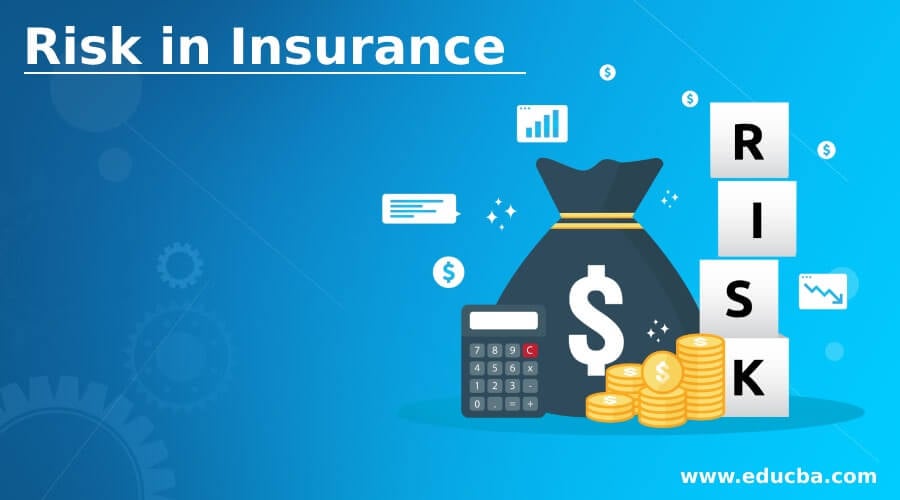Updated June 27, 2023

Definition of Risk in Insurance
Risk in insurance can refer to the possibility or chance that any unexpected event or events will occur leading to the loss of life or loss or damage to any property of the person who takes insurance by paying the insurance premium calculated by the insurers based on the probability of an event and its impact.
Explanation
The risk is any event or happening that no one plans, but if it happens, it eventually causes life or financial loss to any person. The risk is neither inevitable nor predictable. In the case of risk insurance or risk in insurance, insurers assess the policy taken by the policyholder and pay the sum of money (financial value of damages caused) based on terms and conditions covered in the approach to compensate for the loss suffered by the policyholder.
Types of Risk in Insurance
The different types of risk in insurance are as follows:
- Financial Risk: Financial risk is a risk whose monetary value of a loss on a particular event can be measured. The loss assessment can carry out; thus, proper monetary value can be given regarding such losses. We can take, for example, the loss associated because of material damage to the property upon the happening of an event. Therefore, these risks can be insured and are the core subject while doing insurance.
- Non-Financial Risk: Non-financial risk is a risk whose monetary value of a loss on a particular event cannot be measured. Loss assessment is practically not feasible; thus, one cannot measure the same in monetary terms. A wrong decision or choice may result in probable disliking, discomfort, or embarrassment, which could not be measured in monetary terms. This risk cannot insure. An example of non-financial risk is the wrong selection of the type of mobile phone.
- Speculative Risk: Speculative risk is the uncertainty regarding an event being considered and the happening or non-happening of such event would lead to either profit or loss. This type of risk is generally not insurable. An example of this type of risk is purchasing the call option of any stock. The option’s price will depend upon the movement of the associated stock and the time to expiry of the contract.
- Pure Risk: Pure risk relates to the happening of any event which would lead to either loss to the person or may end up in a break-even situation. It will not lead to profit in any circumstances. These types of risks are insurable and non-controllable. This type of risk generally arises in a natural calamity, fire, etc. Upon any natural calamity, it would not, under any circumstances, end up generating profits because of such calamity.
- Fundamental Risk: Fundamental risk is the risk that is intrinsic to the state of being, or it may be an absolute hazard, thus producing no such uncertainty about the loss. The happening of such an event is not under the control of any person. The origin of this type of risk is on an individual level, and its impact can also be felt at a localized level. We can take, for example, the event of an accident on a bus.
- Static Risk: Static risk is the risk that does not involve losses caused by changes in the business environment and remains constant over the period, i.e., the risks associated with the losses that would cause a stable economy. Any unexpected natural event or destructive human behavior mainly causes it. For example, the risk that damage will be caused due to heavy rains is covered under the static risk.
- Dynamic Risk: Dynamic risk associates losses with a stable economy. It affects a large number of individuals as it does not occur regularly. For example, the risk that failure will be caused due to changes in the technology is covered under the dynamic risk.
- Particular Risk: Particular risk can refer to the risks that affect only an individual & not everyone in the community. For example, if any person’s assets are stolen, the loss falls on that person only and not on anyone else. Thus risks are the responsibility of the person, not the society as a whole.
Risk In Insurance and Its Transfer
It prefers that any risk an entity or an individual does not want to bear alone passes on or transfers to the other entity. This process of transferring the risk is known as insurance, where the transferor of risk is known as the insured, and the transferee party is known as the insurer. The person pays an agreed amount known as the premium for the risk transfer. In exchange, the insurer agrees to indemnify the insured against losses that could result from the specified perils. In short, when any person feels unsecured & wishes to get such risk secured by paying a certain amount of money (premium) is known as the transfer of risk in insurance.
Conclusion
Thus, risk in insurance is the risk that any unexpected event will cause loss of life or financial loss to any property. If any person is unwilling to bear such risk and wants to transfer the same, then such transfer is possible by taking the insurance policy. In the case of insurance, the insurer agrees to undertake a person’s risk in exchange for a certain premium, which calculates the essential nature of risk and its impact. If such an unexpected event happens and causes loss to the insured person, the insurer has to pay the amount of loss incurred based on the terms of an insurance policy.
Recommended Articles
This is a guide to Risk in Insurance. Here we also discuss the definition and risk in insurance with transfer and different types. You may also have a look at the following articles to learn more –
